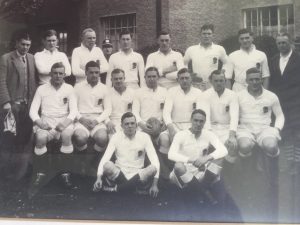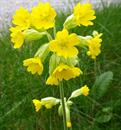My father played rugby for England. He was a hooker who took the penalties and conversions. Straight on, with a toe poke – none of this fancy round-the-corner stuff.
He played for the Bs: Bath, Bristol and Blackheath – the last being the venue for the very first test between England and Australia in January 1909.
I was the youngest of four boys and didn’t hear much from him about his rugby experiences. For the best possible reason (wanting to do better for me than had been done for himself), I was sent away to boarding school when I was eight, limiting the time for shared reminiscences.
There was apparently a connection between that decision about the boys’ schooling and rugby. One RA Gerard played for Taunton and Somerset while still at Taunton School and he and my father went on to play for England together. (See the second picture down at: http://www.cliftonrfchistory.co.uk/1930s/1930s.htm)
As we were given to understand it, the evasiveness and grace of RA Gerard were tragically ineffective in his confrontation with a landmine in North Africa ten or so years later.
The only story I do recall from my father was of him being felled by a punch in front of the grandstand at Cardiff Arms Park by the Welsh hooker of the day. The point of the story was not the altercation itself but the fact that, even though that Welsh hooker was the best getting around, he was never chosen for his country again.

The value of this story was perhaps rooted either in my father’s or in my own perceptions of ‘fair play’ and the extent to which some people would go to demonstrate it.
My brother David has in his possession a cutout part of a browning white shirt on which is a very wilted but still recognisable red rose. He also has a telegram addressed to GG Gregory which reads something like: “You have been selected to play for England against Ireland at Twickenham on Saturday. Be at the ground by 11am and bring your own boots and shorts.”
So I grew up with some sort of special love for rugby union but with no great talent, attributable not only to my diminutive stature but also to the fact that I had no great talent. I was probably the first and only captain of the school fifteen who agreed with the master in charge that, in order to improve the side’s performance, I should be dropped.
After leaving school I played a few games for Keighley in West Yorkshire – games of which I have absolutely no recollection, just a general sense that it was cold and wet.
I left behind some of that wet when I moved to Australia in 1971. I continued to play cricket and hockey, and even some clueless performances for the Uralla Wanderers AFL team, but never any more rugby. And I became a tragic follower of the Canberra Raiders rugby league team.
But the deep well of emotional association with English rugby seems never to have dried.
On the evening of 14 July 2016 I found myself in the Victoria hotel on Wagga’s main street. I cheered ecstatically and forgetfully as Jonny Wilkinson’s drop goal sailed over and only avoided being set upon by 120 cranky CSU students when Tad shepherded me into a safe neutral corner.
But that moment is only one in 1000 for an English rugby fan in Australia. Consider England’s record in test matches in Australia between 1971 and 2015:
Played 15, Won 2, Lost 13, Points for 195, Points against 467
Need I remind you of the games in Brisbane in 1998 (0-76 – eleven tries to nil!) and 2003 (15-51). One of England’s two victories in that period was in Melbourne in 2003. Perhaps that was a sign for English supporters to try a different winter sport.
So have a heart. Let us savour those true-blue English names Vunipola, Itoje, Ford, Brown – and Jones.
gg

